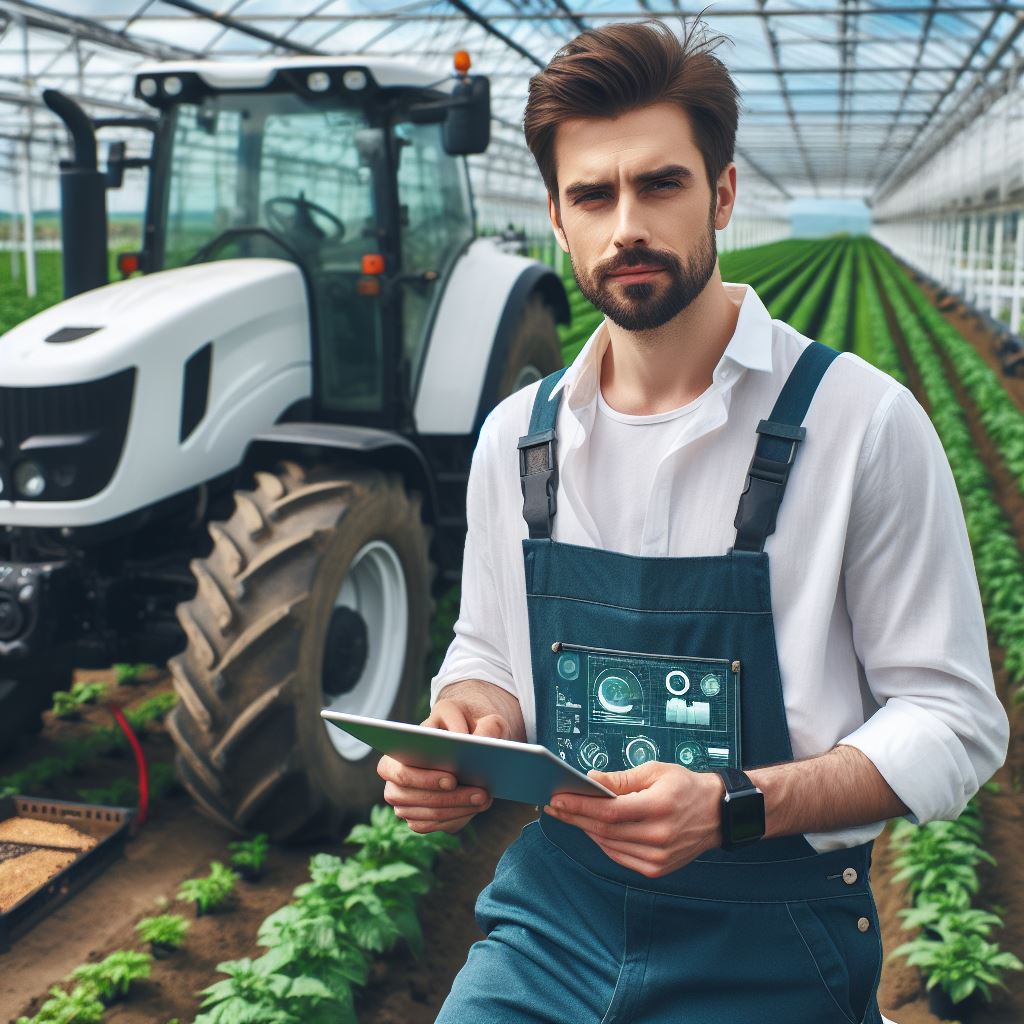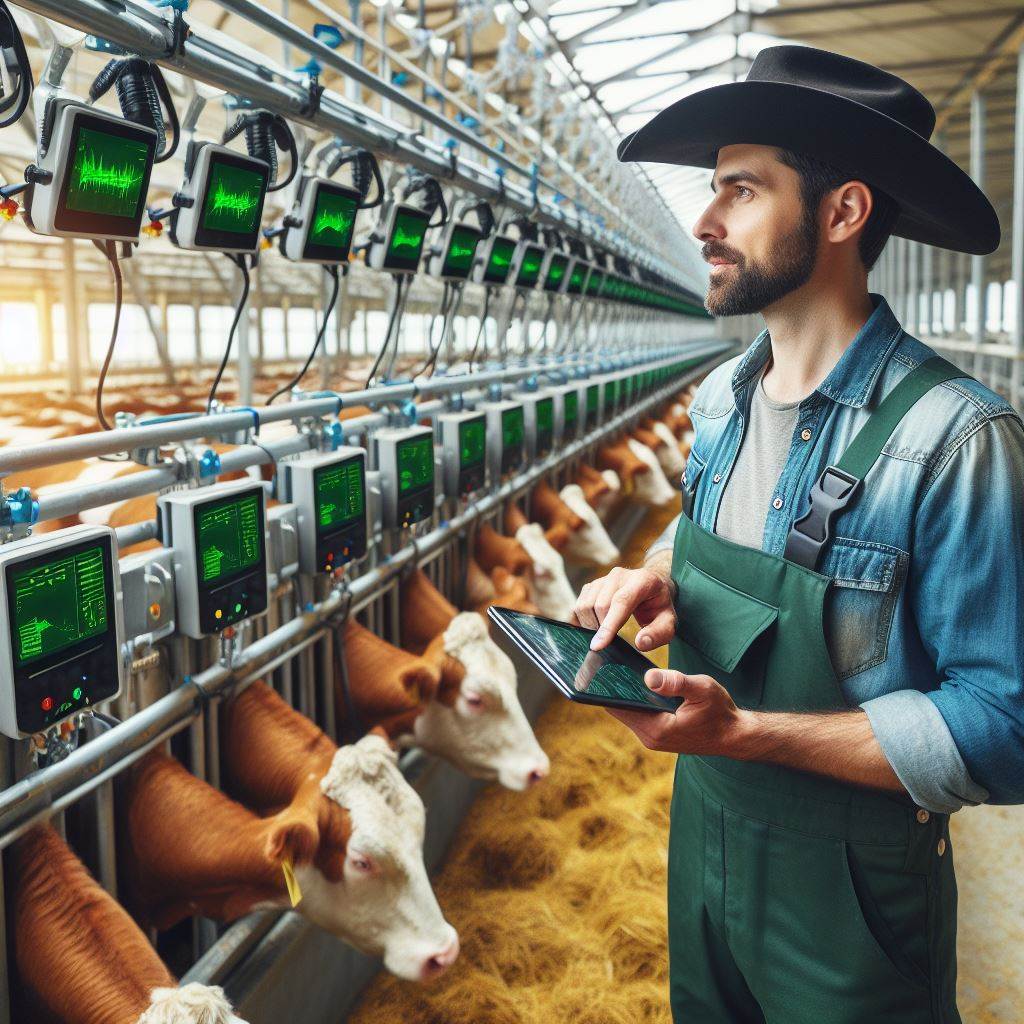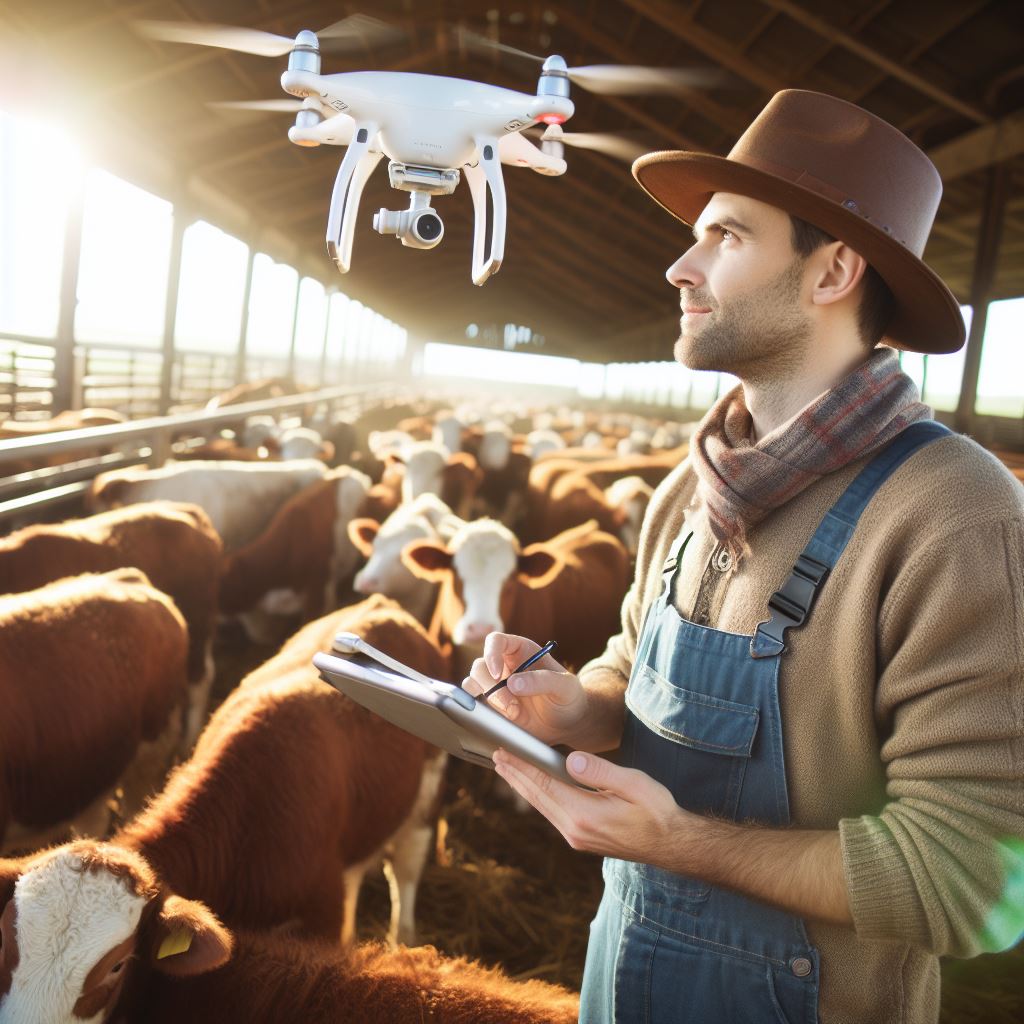Introduction
In recent years, the agriculture industry has witnessed a revolutionary transformation with the emergence of AgriTech startups.
These startups leverage technology to address various challenges faced by farmers and shape the future of farming.
Definition of AgriTech
AgriTech, short for Agricultural Technology, refers to the use of advanced technological tools and techniques in agriculture.
It involves the application of concepts like Internet of Things (IoT), artificial intelligence (AI), robotics, and big data analytics to improve farm efficiency and productivity.
Importance of AgriTech Startups in Modern Agriculture
The significance of AgriTech startups in modern agriculture cannot be overstated.
These startups offer a range of solutions to tackle prevalent agricultural problems, such as limited resources, climate change, and rising global food demand.
Through the use of precision agriculture technologies, farmers can now monitor and analyze essential factors such as soil health, crop growth, and water usage.
This enables them to make data-driven decisions and optimize their farming practices for better results.
Moreover, AgriTech startups provide access to real-time data and analytics, empowering farmers with valuable insights.
This data-driven approach helps to reduce waste, increase crop yields, and minimize environmental impact.
Additionally, AgriTech startups enable the adoption of sustainable and eco-friendly farming practices.
By developing alternative pest control methods or efficient irrigation systems, they reduce chemical usage and conserve natural resources.
Basically, the rise of AgriTech startups has brought about a transformative change in modern agriculture.
These startups not only address the challenges faced by farmers but also offer sustainable solutions for the future of farming.
By embracing AgriTech innovations, we can ensure food security, enhance productivity, and create a more sustainable agricultural ecosystem.
Transform Your Agribusiness
Unlock your farm's potential with expert advice tailored to your needs. Get actionable steps that drive real results.
Get StartedCurrent Challenges in Traditional Farming
Limited resources and labor
- In traditional farming, the availability of resources such as land, water, and soil is limited.
- Farmers often face difficulties in finding skilled labor to carry out farming operations efficiently.
- The lack of resources and labor can hinder productivity and restrict the potential growth of traditional farms.
Environmental impact and sustainability
- Traditional farming practices often result in negative impacts on the environment.
- Excessive use of chemical fertilizers and pesticides pollutes soil and water sources.
- This depletes natural resources and disrupts the delicate ecological balance.
- Additionally, traditional farming practices contribute to deforestation and greenhouse gas emissions.
- Sustainability challenges arise as traditional methods may not be capable of meeting future food requirements.
Increasing global food demand
- As the global population continues to grow, the demand for food increases significantly.
- Traditional farming methods alone may struggle to keep up with the rising demand.
- There is a need for innovative solutions to increase agricultural productivity and ensure food security.
- Conventional farming practices may fall short in meeting the increasing food demand sustainably.
These challenges highlight the pressing need for transformative solutions in the agricultural sector.
AgriTech startups are actively playing a crucial role in shaping the future of farming.
They are introducing cutting-edge technologies and practices to address the limitations of traditional farming.
By leveraging advancements in areas such as automation, artificial intelligence, and data analytics, AgriTech startups have the potential to revolutionize agriculture.
These startups are effectively tackling the challenges faced by traditional farming:
Overcoming limited resources and labor
AgriTech startups are developing innovative solutions to optimize resource utilization in farming.
They utilize precision agriculture techniques to monitor and manage resources efficiently.
Technologies like IoT sensors and drones enable farmers to gather real-time data about soil moisture, crop health, and nutrient levels.
This data-driven approach helps farmers make informed decisions about resource allocation and reduce wastage.
Furthermore, AgriTech startups are creating robotic systems that perform tasks traditionally done by manual labor.
These robots can handle planting, harvesting, and even sorting tasks, reducing dependency on human labor.
Promoting environmental impact and sustainability
AgriTech startups are at the forefront of promoting sustainable farming practices.
They encourage the use of precision agriculture methods to minimize chemical inputs and reduce environmental pollution.
Startups are developing smart irrigation systems that analyze weather and soil data to deliver precise amounts of water to crops.
This minimizes water wastage and enables efficient use of this valuable resource.
AgriTech solutions also focus on implementing organic farming practices that prioritize soil health and biodiversity.
By reducing the reliance on chemical fertilizers and pesticides, these startups contribute to a healthier ecosystem.
Meeting increasing global food demand
AgriTech startups are working towards increasing agricultural productivity to meet global food requirements.
They are developing innovative methods for vertical farming, hydroponics, and aeroponics.
These approaches enable the cultivation of crops in controlled environments, eliminating the constraints of land availability.
Startups are also leveraging data analytics and AI to optimize crop yields and maximize output.
By harnessing technology, AgriTech startups can help bridge the gap between food demand and supply.
In short, traditional farming faces numerous challenges that can hinder its ability to meet the demands of a growing population sustainably.
AgriTech startups offer promising solutions to overcome these challenges by implementing advanced technologies and sustainable practices.
Showcase Your Farming Business
Publish your professional farming services profile on our blog for a one-time fee of $200 and reach a dedicated audience of farmers and agribusiness owners.
Publish Your ProfileThese startups play a crucial role in shaping the future of farming and ensuring food security for generations to come.
Read: Sustainable Ag Tech: What’s New?
The Rise of AgriTech Startups
Definition and purpose of AgriTech startups
- AgriTech startups refer to technology-oriented companies that aim to revolutionize the agricultural industry.
- These startups leverage cutting-edge technologies to develop solutions for various farming challenges.
- The primary purpose of AgriTech startups is to optimize agricultural processes, increase productivity, and ensure sustainable farming practices.
Advancements in technology driving AgriTech startups
- The emergence of Internet of Things (IoT) has facilitated the development of smart farming solutions.
- Drones, equipped with sensors and cameras, assist farmers in monitoring crop health and identifying potential issues.
- Artificial Intelligence (AI) and machine learning algorithms enable data analytics, aiding in predictive and prescriptive farming practices.
- Precision agriculture technologies, such as GPS-enabled machinery and satellite imagery, enhance farming accuracy and efficiency.
- Blockchain technology ensures transparency and traceability in the agricultural supply chain, reducing fraud and improving food safety.
Role of AgriTech startups in enhancing farming practices
- AgriTech startups offer innovative solutions for crop monitoring, enabling farmers to detect disease outbreaks and nutrient deficiencies.
- These startups provide real-time weather data and predictive analytics, assisting farmers in making informed decisions.
- Improved irrigation systems equipped with sensors and automated controls help conserve water resources and reduce waste.
- AgriTech startups empower farmers with data-driven insights, enabling them to optimize resource allocation and minimize environmental impact.
- Collaborative platforms and marketplaces created by AgriTech startups connect farmers directly with consumers, eliminating intermediaries and ensuring fair prices.
- Through remote monitoring and autonomous machinery, AgriTech startups help reduce labor requirements and increase operational efficiency.
- The use of precision agriculture technologies by AgriTech startups enhances crop yield, reduces chemical usage, and minimizes environmental damage.
- AgriTech startups play a vital role in promoting sustainable farming practices, such as organic farming and regenerative agriculture.
- By bridging the digital divide in rural areas, AgriTech startups ensure equal access to technology and knowledge for farmers globally.
- The solutions provided by AgriTech startups contribute to global food security by increasing agricultural productivity and reducing post-harvest losses.
Generally, AgriTech startups are revolutionizing the agricultural industry by harnessing advancements in technology.
These startups aim to optimize farming practices, increase productivity, and ensure sustainable agriculture.
Through innovative solutions, data analytics, and precision agriculture technologies, AgriTech startups empower farmers and enhance their decision-making capabilities.
By promoting transparency, traceability, and direct farmer-consumer connections, AgriTech startups also contribute to a fair and efficient agricultural marketplace.
With their focus on sustainability and global food security, AgriTech startups are shaping the future of farming.
Read: IPM: A Farmer Guide to Eco-Farming
Examples of Successful AgriTech Startups
AgriTech startups have harnessed technology to transform traditional farming practices, leading to more sustainable and efficient agricultural methods.
Here are some examples of successful AgriTech startups that have made a significant impact on the future of farming:
Smart farming and precision agriculture
Use of sensors and IoT devices to monitor crops and livestock
One of the key areas where AgriTech startups are making strides is in the field of smart farming and precision agriculture.
By incorporating advanced technologies like sensors and IoT devices, these startups have enabled real-time monitoring of crops and livestock.
This allows farmers to gather crucial data on factors such as soil moisture levels, temperature, and nutrient content, which helps them make informed decisions and optimize their farming practices.
Predictive analytics and data-driven decision making
Predictive analytics and data-driven decision making have revolutionized the agricultural industry.
Startups are using sophisticated algorithms to analyze vast amounts of data, ranging from weather patterns to historical crop yields.
This data-driven approach enables farmers to predict potential issues or challenges and take proactive measures to mitigate them.
By leveraging predictive analytics, AgriTech startups are empowering farmers to optimize resource allocation, increase productivity, and reduce losses.
Vertical farming and indoor agriculture
Utilization of controlled environments and hydroponics
Vertical farming and indoor agriculture have gained prominence as innovative solutions to address the challenges of limited arable land and environmental sustainability.
AgriTech startups are constructing vertical farms that utilize controlled environments and hydroponics.
By carefully controlling factors like lighting, temperature, and nutrient delivery, these startups are able to cultivate crops vertically, stacking them in multiple layers.
This not only maximizes land utilization but also eliminates the need for harmful pesticides, significantly reducing the environmental impact of farming.
Improved crop yield and reduced water usage
Vertical farming also offers improved crop yield compared to traditional farming methods.
By controlling all the variables and ensuring optimal conditions for growth, AgriTech startups can achieve higher yields per square foot of land.
Additionally, vertical farming requires significantly less water compared to conventional agriculture, as the water used in hydroponic systems can be recycled and circulated, minimizing wastage.
Robotics and automation in agriculture
Autonomous vehicles and drones for crop monitoring and maintenance
AgriTech startups are harnessing the power of robotics and automation to revolutionize various aspects of agriculture.
The use of autonomous vehicles and drones for crop monitoring and maintenance has become increasingly common.
These technologies enable farmers to collect accurate data about crop health, identify pest infestations or nutrient deficiencies, and take immediate action.
Drones equipped with sensors and cameras can quickly survey large fields, providing real-time insights and allowing farmers to respond promptly to any issues.
Robotic systems for precise planting, harvesting, and fertilizing
In addition to autonomous vehicles and drones, AgriTech startups are developing robotic systems for precise planting, harvesting, and fertilizing.
These robots offer unparalleled precision, ensuring optimal seed placement, minimal crop damage during harvest, and precise delivery of fertilizers.
By automating these labor-intensive and time-consuming tasks, startups are helping farmers increase operational efficiency and reduce the reliance on manual labor.
Essentially, the success of these AgriTech startups exemplifies the immense potential of technology in shaping the future of farming.
As these innovations continue to evolve and gain traction, we can expect further advancements in the agricultural sector, leading to more sustainable practices, higher yields, and increased food security.
Read: Organic Farming: Tech Advancements Guide

Benefits of AgriTech Startups
Increased efficiency and productivity
- AgriTech startups employ innovative technologies to streamline farming processes.
- Automation and data-driven solutions enable farmers to optimize their operations and increase productivity.
- Precision farming techniques, such as GPS guidance systems, help farmers maximize crop yield and reduce waste.
Environmental sustainability and reduced resource consumption
- AgriTech startups focus on sustainable farming practices to minimize environmental impact.
- Smart irrigation systems and sensor-based technologies enable efficient water usage, conserving this valuable resource.
- Precision spraying techniques reduce the need for chemical pesticides, promoting a healthier ecosystem.
Enhanced quality control and food safety
- Through advanced technologies, AgriTech startups enable real-time monitoring and analysis of crops.
- Sensors and imaging technologies detect diseases and nutritional deficiencies, ensuring timely interventions.
- Automated sorting and quality control systems minimize the risk of contaminated or substandard produce reaching consumers.
Improved accessibility to farming technologies for small-scale farmers
- AgriTech startups provide cost-effective and scalable solutions, leveling the playing field for small-scale farmers.
- Mobile applications and cloud-based platforms offer easy access to valuable information and expert advice.
- By connecting farmers through online marketplaces, startups reduce dependency on traditional intermediaries, empowering small-scale producers.
In general, AgriTech startups bring a multitude of benefits to the farming industry.
They enhance productivity and efficiency, promote environmental sustainability, improve food safety, and provide accessible technologies for small-scale farmers.
Embracing these innovations will shape a future where farming is more sustainable, efficient, and inclusive for everyone.
Read: Vertical Farming: The Future of Urban Agri
Challenges and Limitations of AgriTech Startups
High initial investment costs
One of the major challenges that AgriTech startups face is the high initial investment costs.
Implementing new technologies and developing innovative solutions in agriculture requires a significant amount of funding.
Showcase Your Farming Business
Publish your professional farming services profile on our blog for a one-time fee of $200 and reach a dedicated audience of farmers and agribusiness owners.
Publish Your ProfileIntegration challenges with traditional farming methods
AgriTech startups often face integration challenges when introducing their technologies to traditional farming methods.
It can be difficult to convince farmers to adopt new practices and integrate them into their existing farming systems.
Limited acceptance and adoption by older generation farmers
The limited acceptance and adoption of AgriTech solutions by older generation farmers present a significant limitation.
Older farmers are often resistant to change and may be skeptical of new technologies, making it challenging for startups to gain widespread acceptance.
The Future of AgriTech Startups
In the rapidly evolving world of agriculture, AgriTech startups hold immense potential to shape the future of farming.
Through the integration of innovative technologies, these startups are revolutionizing traditional agricultural practices and contributing to sustainable and efficient food production.
Potential technological advancements in AgriTech
- Precision farming: AgriTech startups are leveraging technologies such as IoT, drones, and satellite imagery to enable precision agriculture.
- Big data analytics: AgriTech startups are using advanced algorithms to analyze large data sets and provide actionable insights to farmers.
- Robotics and automation: AgriTech startups are developing robots to perform various tasks, including planting, harvesting, and monitoring crop health.
- Vertical farming: AgriTech startups are implementing vertical farming techniques, allowing crops to be grown indoors under controlled conditions.
These technological advancements have the potential to increase productivity, reduce environmental impact, and enhance overall efficiency in agriculture.
Collaboration between AgriTech startups and traditional farming practices
AgriTech startups are increasingly collaborating with traditional farming practices to harness the full potential of their technologies while respecting established agricultural wisdom.
- Knowledge exchange: AgriTech startups and traditional farmers are sharing expertise and experience to bridge the gap between technology and practical farming.
- Pilot projects: Collaborative pilot projects allow AgriTech startups to test their innovations on real farms and gather valuable feedback.
- Training programs: Startups are organizing training programs to educate farmers about the effective use of AgriTech solutions.
This collaboration ensures that AgriTech startups develop solutions that are tailor-made for farmers’ needs while incorporating the latest technological advancements.
Continued growth and positive impact on the agriculture industry
As AgriTech startups continue to innovate and disrupt the agriculture industry, their growth and positive impact are expected to accelerate.
- Increase in productivity: Advanced technologies will enable farmers to optimize their resources, leading to increased crop yields.
- Sustainable farming practices: AgriTech startups are promoting sustainable practices, including efficient water usage and reduced chemical inputs.
- Improved food quality and safety: Through advanced monitoring systems, AgriTech startups are ensuring the production of safe and high-quality food.
- Global food security: AgriTech innovations will play a crucial role in meeting the growing food demand of the global population.
Furthermore, the positive impact of AgriTech startups extends beyond the farm.
Their technologies have the potential to create new job opportunities and strengthen rural economies.
In essence, AgriTech startups are driving a transformative shift in the agriculture industry.
Through technological advancements, collaboration with traditional farming practices, and their continued growth, these startups are shaping the future of farming.
The benefits of AgriTech extend not only to farmers but also to the global food system and the environment, ensuring a sustainable and prosperous future for the agriculture industry.
Conclusion
Recap of the importance and contributions of AgriTech startups
By recognizing the importance and contributions of AgriTech startups, farmers can not only benefit from improved efficiency and reduced costs but also contribute to the overall development of the agricultural sector.
AgriTech startups have played a significant role in bridging the gap between traditional farming methods and modern technological advancements.
They have introduced state-of-the-art tools and systems that boost crop production, optimize resource utilization, and promote sustainable farming practices.
Through the implementation of precision agriculture, smart irrigation systems, automated machinery, and data analytics, AgriTech startups have empowered farmers with real-time information and insights to make informed decisions.
Moreover, they have facilitated the adoption of eco-friendly practices, including organic farming and integrated pest management, reducing the environmental impact of farming operations.
Encouragement for farmers to embrace and support AgriTech innovations
It is crucial for farmers to embrace and adopt these AgriTech innovations to stay competitive in an ever-evolving industry.
By integrating these technologies into their farming practices, farmers can achieve increased yields, enhanced crop quality, and reduced input costs, ultimately leading to higher profits.
Supporting AgriTech startups also encourages the development of groundbreaking technologies tailored to the specific needs of the farming community.
By collaborating with these startups, farmers can provide valuable input and insights, contributing to the creation of tailor-made solutions that address their unique challenges.
In a nutshell, AgriTech startups have the potential to shape the future of farming by driving innovation, sustainability, and profitability.
By embracing and supporting these startups, farmers can unlock new opportunities and efficiencies, ultimately ensuring a more productive and sustainable agricultural sector.
The partnership between farmers and AgriTech startups is a recipe for success, revolutionizing the way we farm and nourish the world.




